Studio Visit
Elmgreen and Dragset Fuel Their Creativity With Croissants in the Studio—and When All Else Fails, They Go to the Bar
The Scandinavian duo worked in situ to finish their first show at Pace Gallery in New York.
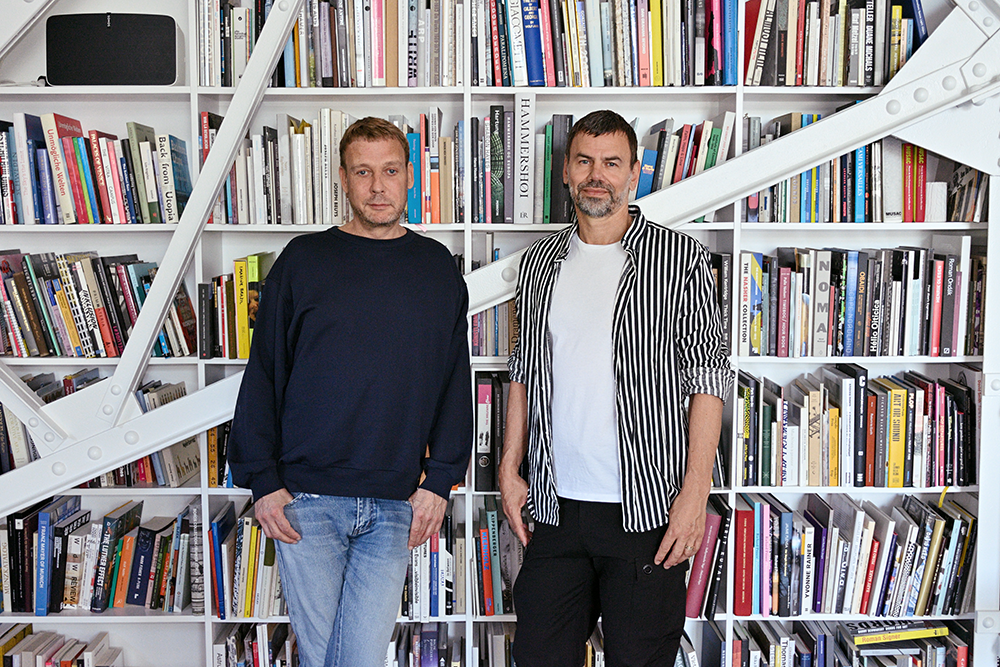
The Scandinavian duo worked in situ to finish their first show at Pace Gallery in New York.

Eileen Kinsella

After well over a year of lockdowns and restrictions, the dynamic Scandinavian artist duo known as Elmgreen & Dragset is relishing the opportunity to finally travel internationally again. And judging from their current projects, the two have been extraordinarily prolific over the course of the past year and a half.
In September, the artists were on hand at Art Basel in Switzerland, where their outdoor art installation on the Messeplatz created a sensation. The Outsiders (2020) featured an older-model stationary Mercedes-Benz wagon, white with Russian license plates, that visitors wandered up to before curiously peering through the windows at two lifelike figures spooning and sleeping in their car amid packing tape, labels, installation tools and various empty bags of chips and snacks. The story behind the work is of two financially strapped art handlers who drive to the fair for work but have to sleep in their car—as much an ode to love as to the hard work that goes into staging and putting together a spectacle like an art fair, according to the artists.
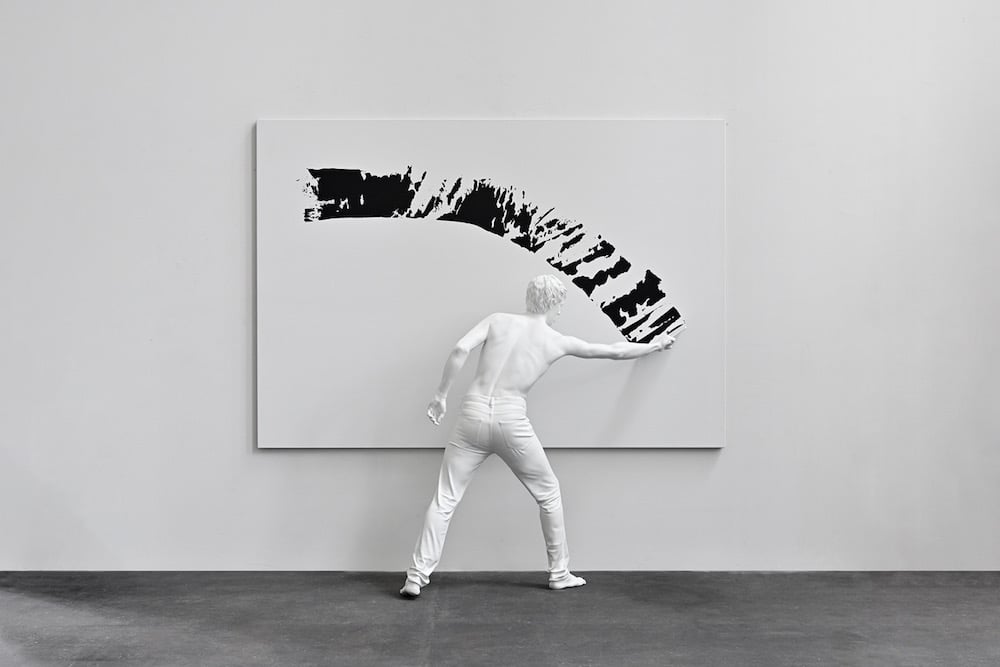
Elmgreen & Dragset, The Painter, Fig.1, (2021). Photo: Elmar Vestner
Working together since 1995, Michael Elmgreen and Ingar Dragset are sought after for their sculptural installations, which often uses fictional characters to tell a story. Last week, they led a walkthrough of their new show at Pace Gallery in Chelsea, their first there since joining the gallery last year. The show’s title, “The Nervous System,” is a sly reference to the widespread fear and uncertainty experienced by many during lockdown.
Pace describes the show, which occupies the entire first floor of the 25th Street space, as “a surreal depiction of a dysfunctional home within the gallery’s walls.” In this mise-en-scène, an elderly, shirtless man snoozes in a wheelchair, not far from a marble fireplace which is engraved with block letters: “The Oracles Are Gone And Lost Are The Gods.” The artists made it clear that the works are open to interpretation: “Is the entire scene real or just in this man’s head?” asks Elmgreen with a playful smile.
Beyond the faux home’s walls, a bright orange tennis court is visible through a set of windows. It is presumably just after a match has finished—the losing player is sprawled face down on one side of the court, while on the other side, the victor stands with his back turned, holding a huge trophy cup (in progress image below) but with a glum pose that hardly suggests celebration.
The pair normally work out of their studio in Berlin, but the sprawling Pace show has necessitated some in-situ work in New York. We caught up with the artists as they prepared their installation.
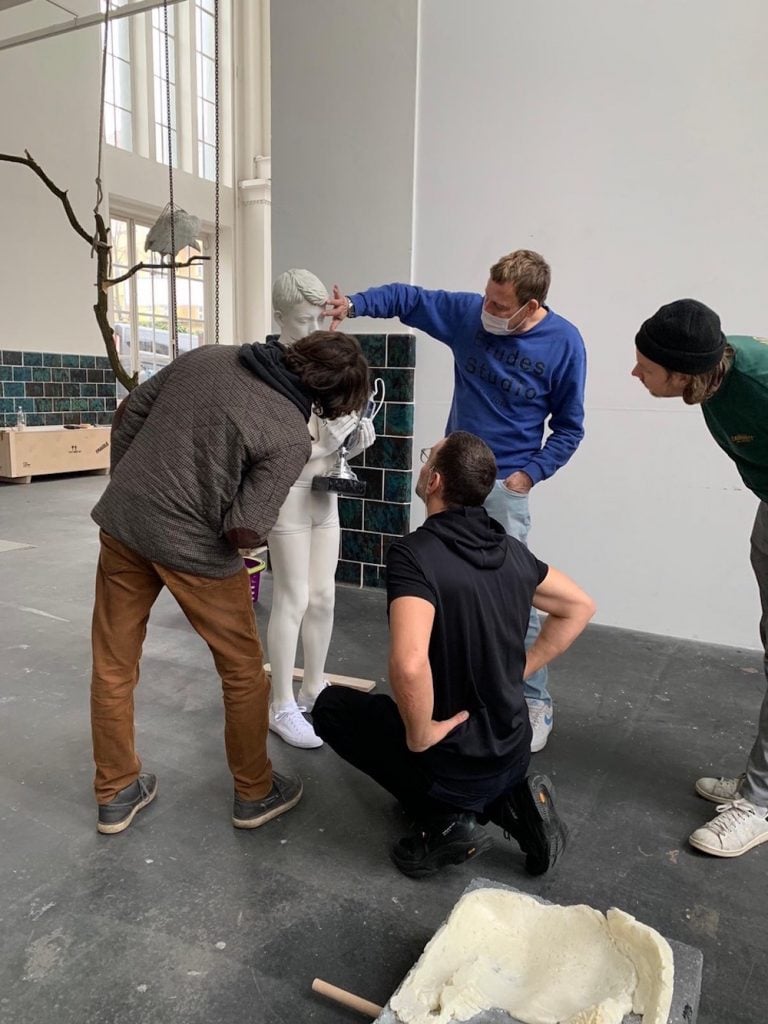
Photo: Studio Elmgreen & Dragset.
What are the most indispensable items in your studio and why?
The 11-and-a-half-foot-long Less table by Jean Nouvel in our communal kitchen. Around that we gather for discussions, sketching, presentations, meetings, mock-ups, meals, drinks…“Less” is more, for sure!
What is the studio task on your agenda tomorrow that you are most looking forward to?
We test the installation of all our works in the studio, e.g., when they arrive back from a foundry or one of the lacquer shops that we work with. It’s always exciting to see the different elements coming together. We also enjoy working on new printed matter. We’ve designed the upcoming exhibition catalogue in-house, with our graphic designer Anja Schiller, who has been with us for 10 years. She’s ready to present us with the first dummy.
However, a significant part of our studio activity has temporarily moved to Pace Gallery in New York, where we are installing our show (which opened November 9). We are doing quite the rebuild of their ground-floor space, so both of us and some of our studio team are here, reconfiguring the interior features of the gallery and un-crating all the artworks.
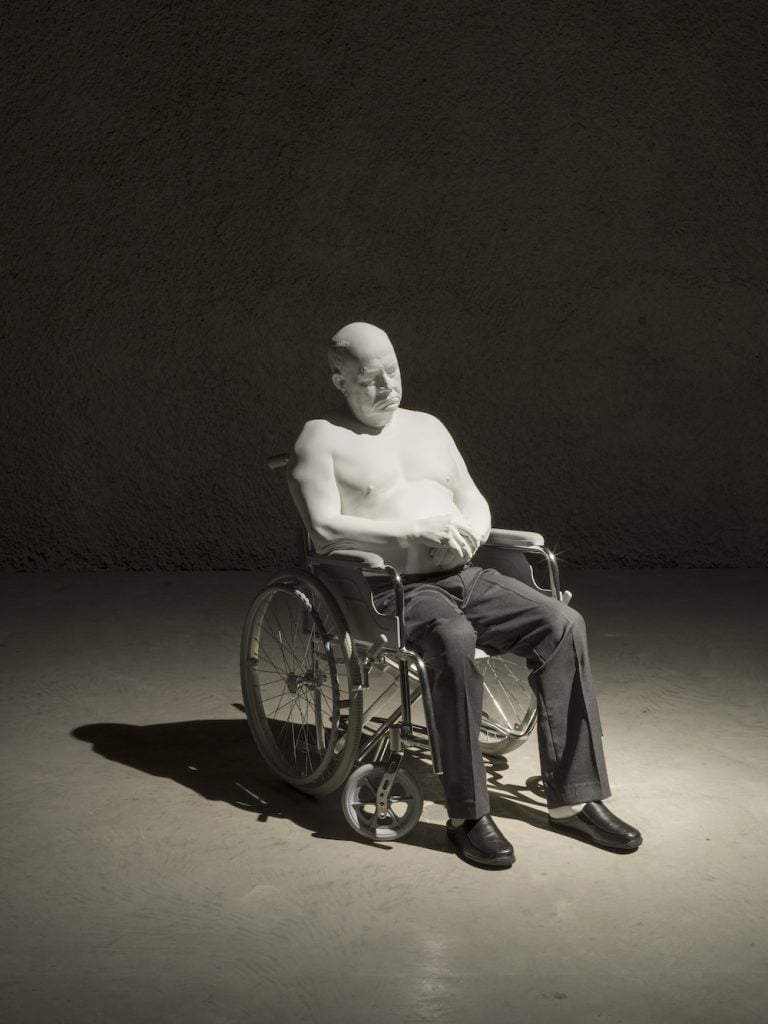
Elmgreen & Dragset, Bogdan (2020). Photo by Roman März. Courtesy of Pace Gallery.
What kind of atmosphere do you prefer when you work? Do you listen to music or podcasts, or do you prefer silence? Why?
Our work is based on dialogue, on communication, so we do not really need music. But if we work very late, we might put on some music. The studio in Berlin has some really crazy acoustics since the ceiling height is more than 46 feet.
What trait do you most admire in a work of art? What trait do you most despise?
Works that are able to surprise us and go beyond the normal mechanisms of perception always stick in our minds. Sometimes you experience a work where your way of reading or decoding the visual message has to be totally re-evaluated. You will always remember those moments. “Despise” is a tough word, but we both dislike art that tries too hard to look like art.
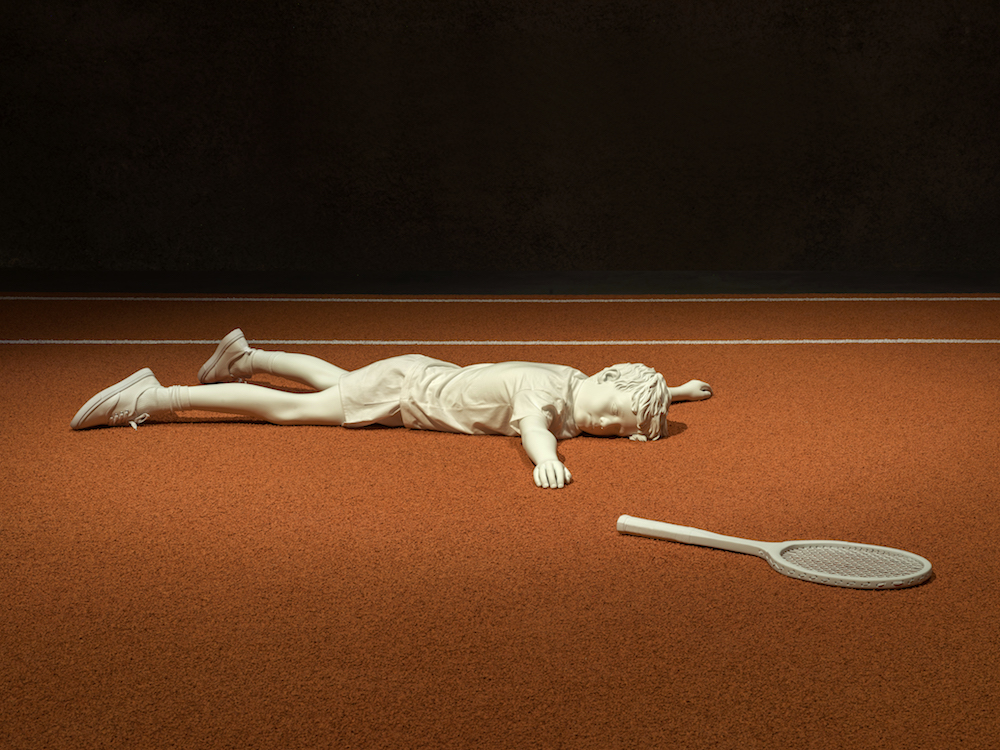
Elmgreen & Dragset, Kev (2020). Photo by Roman März. Courtesy of Pace Gallery.
What snack food could your studio not function without?
Our studio manager, Margo Lauras, is French, and has sniffed out all the best bakeries in Berlin. There are some kick-ass croissants in this town, too. And when we’re in Denmark, we stock up on chocolate-coated licorice. Besides snacks, we eat lunch altogether every day in the studio. We have a cook who comes in to make healthy food for us. It is important to have a break together and speak about things other than issues related to production. Normally, we also have yoga once a week. But of course, these things were interrupted by the pandemic for a while. It is good to be back to something close to normal again.
Who are your favorite artists, curators, or other thinkers to follow on social media right now?
There are too many to single out just a few.
When you feel stuck in the studio, what do you do to get un-stuck?
Read, relax, go for a walk, or go out and drink, ha ha. Sometimes our works are born in bars.
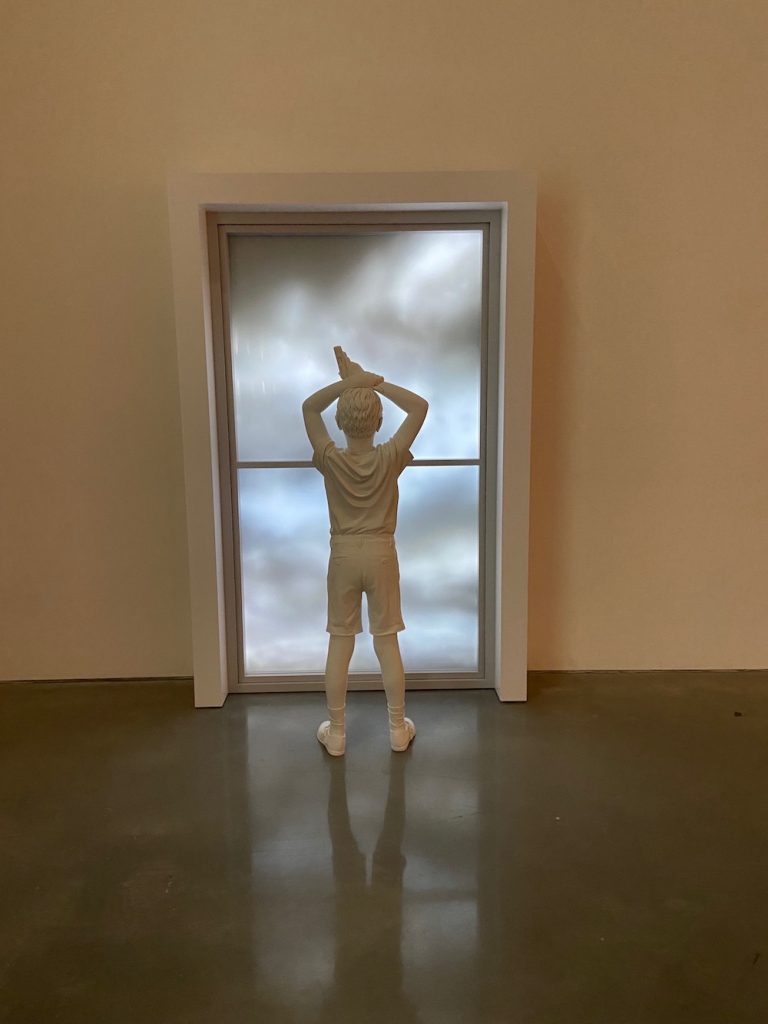
Installation view, Elmgreen and Dragset, “The Nervous System,” at Pace Gallery. Photo: Eileen Kinsella.
What is the last exhibition you saw (virtual or otherwise) that made an impression on you?
The group show “Information (Today)” and the solo show by Matthew Angelo Harrison at the Kunsthalle Basel in September were both amazing. That institution never lets you down. The Arcimboldo show at Pompidou Metz was also really well-curated and staged. The exhibition design was interesting, and his influence on Surrealism and contemporary art became very clear. The catalogue is impressive, too.
The New Museum Triennial had quite a few great pieces by artists who we were not aware of, too.
If you had to put together a mood board, what would be on it right now?
Our mood board is always our upcoming exhibitions. The titles alone probably say it all: “The Nervous System” at Pace New York; “It’s Just a Phase” at Kjøpmannsgata Ung Kunst in Trondheim, Norway; and “Useless Bodies?” at the Fondazione Prada, Milan, next spring.